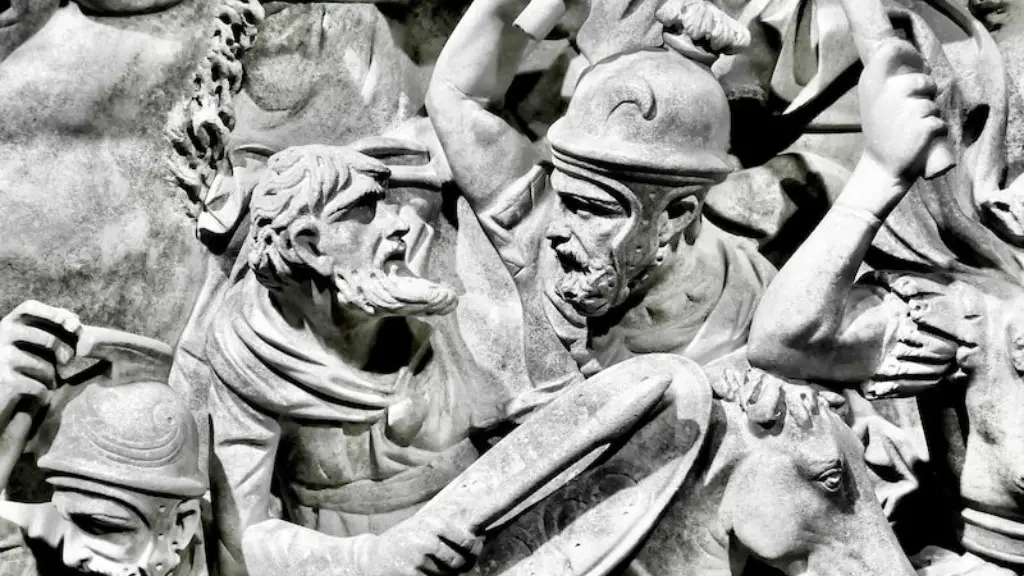Introduction
The rule of law is a legal maxim established in ancient Rome and still in use today. In modern society, the rule of law seeks to provide the legal foundation to protect citizens from the potential abuses of the executive, so that democratic government is properly maintained. Ancient Rome was no different, as the rule of law was a crucial component for justice and stability. This article examines the rule of law in ancient Rome and its modern-day implications.
Historical Context
Rome was a vast empire which had a complex legal system consisting of both public and private laws. Prior to the rule of law, legal disputes were resolved through regional customs and traditions that were often swayed by the opinions of the local aristocracy. Under the rule of law, citizens had equal rights to use the law to resolve disputes, advance their interests, and protect themselves from actions that violated their rights.
Nevertheless, the rule of law in Rome was not always enforced fairly. The Roman Senate, which served as the highest court in the empire, was comprised of only elite members who were primarily wealthy landowners. This gave them the power to abuse the rule of law in their favor, while ordinary citizens had little recourse or protection against the abuse of power.
The 12 Tables of Rome
In order to address this imbalance, the Senate issued the Twelve Tables of Rome, which were a set of legal codes that became the foundation of Roman law. These laws were inscribed on twelve bronze tablets, which were placed in the public forum so that all citizens could read them. These laws attempted to ensure that all citizens were held accountable to the same standard of justice, regardless of their social stature.
The Twelve Tables of Rome were divided into twelve chapters, each of which prescribed different aspects of the law. These laws covered topics ranging from property rights, marriage, legal procedures, and religious rituals. The Twelve Tables of Rome marked a significant advance in the history of justice and civil rights, as it was the first attempt to provide a legal system where all citizens were expected to follow the same set of rules.
The Role of jurors
To enforce the rule of law, Rome instituted a system of juries to resolve legal disputes. The jury system was composed of ordinary citizens from all walks of life, giving even the lowest members of society a chance to participate in the legal process. Jurors had the responsibility of deciding guilt in legal cases, and were expected to render decisions based on their understanding of the law and their impartial assessment of the facts. This system allowed citizens to have a say in the administration of justice, and ensured that justice was applied fairly and evenly.
Continued Influence
The rule of law in ancient Rome has continued to influence the modern legal system. Many of the principles laid out in the Twelve Tables of Rome, such as equal protection under the law, the importance of evidence in court cases, and the involvement of jurors are still in use today. The rule of law in ancient Rome has laid the foundation for a system of justice that has served to protect the rights of citizens for centuries.
Relevance in Modern Times
The principles laid out in the Twelve Tables of Rome are still relevant in modern times. As the world becomes increasingly connected and globalized, it is important to ensure that the rule of law is propagated and respected in all societies. Without the rule of law, citizens become vulnerable to the whims of the few, and their rights can be taken away without the due process of law.
It is therefore essential to strive for a justice system that provides all citizens with equal protection under the law. This can be achieved through the implementation of concrete laws and regulations that reflect the principles laid out in the Twelve Tables of Rome, such as upholding equal protection, transparent court proceedings, and unbiased juries.
Conclusion of Ancient Rome
The rule of law in ancient Rome was a crucial component of stability and justice in the Roman Empire. The Twelve Tables of Rome laid the foundation for a system of justice that has continued to influence the legal system in the modern world. The principles laid out in the Twelve Tables of Rome are still relevant today, as they provide the legal framework needed to ensure the protection of citizens and the respect of their rights.
Modern Practical Application
The rule of law is not only important in ensuring that citizens are guaranteed protection and due process of law, but is also vital for maintaining a functioning democracy. In an era of unprecedented technology and communication, it is more important than ever to ensure that the rule of law is being applied fairly and evenly.
In many countries, however, there are still signs of political abuse, corruption, and power imbalances that can only be addressed by implementing a strong legal framework for justice. In order for citizens to be guaranteed their rights and freedoms, it is essential to ensure that the rule of law is upheld and respected.
Issues of Enforcement
The implementation of a rule of law in countries around the world is not a straightforward process, however. The challenges of implementing strong rule of law can vary based on a country’s history and culture. For example, in countries with a long history of conflict and mistrust, the rule of law may be seen as an imposition of foreign powers, or a usurpation of national sovereignty.
Moreover, in order for the rule of law to be justly enforced, a country must have functioning institutions, an independent judiciary, and a culture of respect for the law. Without these factors, the rule of law may be nothing more than a facade, with those in power using it to consolidate their grip on society.
Impact of Technology
The rapid advancement of technology has also brought new challenges to the enforcement of the rule of law. As digital technology increases in complexity and reaches an ever-widening audience, governments must ensure that technology is used responsibly. In this era of big data and high-speed communications, the potential for privacy intrusion, government-sanctioned surveillance, and misuse of digital technology is an ever-present threat.
The rule of law is thus more important than ever in ensuring that citizens are protected from such abuses. Governments must ensure that they have clear regulations on the use of digital technology, and that individuals are not subjected to unwarranted or unlawful surveillance or search and seizure.
The Role of International Organisations
International organizations such as the United Nations and the European Union have also played an important role in promoting the rule of law. These organizations have established treaties and agreements that act as a framework for countries to adhere to in their respective legal systems. In addition, they provide assistance and advice to countries in transitioning from authoritarian regimes to more liberal democracies.
Through their work, international organizations can help countries implement strong legal infrastructures that protect citizens from abuse of power and ensure that their rights and freedoms are respected. This is a crucial step in building a culture of respect for the rule of law.


